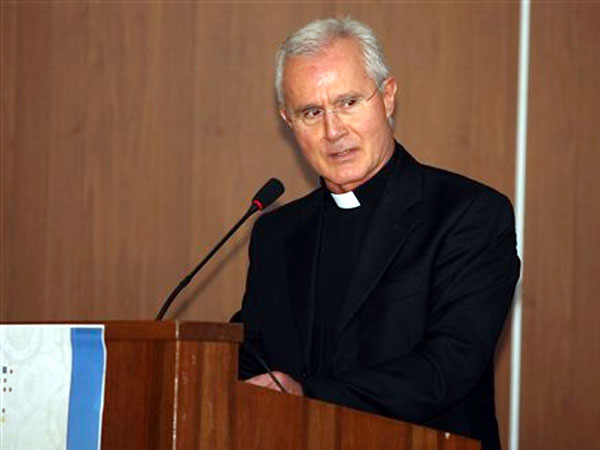ROME, Italy—A former Vatican accountant known as “Mr 500” for his cash-rich lifestyle was acquitted by an Italian court on Monday of corruption and attempted money-smuggling.
Monsignor Nunzio Scarano was a chief accountant for APSA, the organization that manages the Vatican’s vast real estate portfolio, before his arrest in June 2013 for allegedly plotting to smuggle millions of euros in cash into Italy.
READ: Italy police re-arrest Vatican monsignor
Investigators had accused Scarano of hatching a plot to use a private plane to repatriate 20 million euros ($22 million) that were untaxed from Switzerland, on behalf of a rich family of ship owners from Naples.
A court in Rome found Scarano innocent of corruption and attempted money-smuggling but guilty of making false accusations against one of his co-defendants, slapping him with a two-year suspended sentence.
READ: Senior Vatican cleric arrested for fraud denies charges
The monsignor is still on trial in southern Italy in his home town of Salerno on separate charges of money-laundering through the Vatican’s bank, the official name for which is the Institute of Religious Works (IOR).
After his arrest in 2013, the Vatican froze assets worth 2.2 million euros belonging to Scarano, who the press dubbed “Mr 500” for the large amounts of 500 euro notes he was reported to carry on him.
The prelate insisted he was innocent and wrote a letter to Pope Francis accusing his lay bosses of abusive activities which he said were covered up by some cardinals, who he claimed were being blackmailed.
Charity donations, luxury apartment
When fresh charges were brought against him in 2014, Italian police seized his luxury 17-room apartment and blocked nearly nine million euros on current accounts linked to the senior Italian cleric.
In the second, ongoing trial, Scarano is accused of taking cheques marked “Donation for the Poor” and in return giving cash from accounts at the Vatican bank.
Police at the time said they had uncovered at least five million euros that Scarano “had at his disposal” and alleged he made extensive property investments in Salerno.
The prelate’s lawyer, Silverio Sica, said his client used the money for charity and could not be responsible for the provenance of donations he received.
The affair landed the IOR bank, renowned for a murky past and links to the mafia, back in the global headlines.
The Vatican, the world’s smallest sovereign state, has launched a series of reforms aimed at bringing the institution back into line with international standards against money laundering.
The bank has been plagued by scandals in the past and its former president, Paul Marcinkus, sheltered in the Vatican for years to fight off repeated attempts by Italian judicial authorities to arrest him in the 1980s.
In December the Council of Europe’s Moneyval committee—which combats money laundering and terrorist financing—urged the Vatican to start prosecuting people found to have used the IOR and asset management body for criminal ends.
While it found an internal review of the accounts, which has accelerated under Pope Francis, “appears to have been a success,” it was more equivocal about progress on ASPA pending the full findings of ad hoc inspections.
